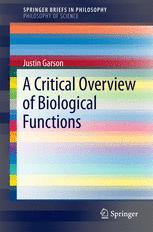

Most ebook files are in PDF format, so you can easily read them using various software such as Foxit Reader or directly on the Google Chrome browser.
Some ebook files are released by publishers in other formats such as .awz, .mobi, .epub, .fb2, etc. You may need to install specific software to read these formats on mobile/PC, such as Calibre.
Please read the tutorial at this link: https://ebookbell.com/faq
We offer FREE conversion to the popular formats you request; however, this may take some time. Therefore, right after payment, please email us, and we will try to provide the service as quickly as possible.
For some exceptional file formats or broken links (if any), please refrain from opening any disputes. Instead, email us first, and we will try to assist within a maximum of 6 hours.
EbookBell Team

0.0
0 reviewsThis book is a critical survey of and guidebook to the literature on biological functions. It ties in with current debates and developments, and at the same time, it looks back on the state of discourse in naturalized teleology prior to the 1970s. It also presents three significant new proposals. First, it describes the generalized selected effects theory, which is one version of the selected effects theory, maintaining that the function of a trait consists in the activity that led to its differential persistence or reproduction in a population, and not merely its differential reproduction. Secondly, it advances “within-discipline pluralism” (as opposed to between-discipline pluralism) a new form of function pluralism, which emphasizes the coexistence of function concepts within diverse biological sub-disciplines. Lastly, it provides a critical assessment of recent alternatives to the selected effects theory of function, namely, the weak etiological theory and the systems-theoretic theory. The book argues that, to the extent that functions purport to offer causal explanations for the existence of a trait, there are no viable alternatives to the selected effects view.
The debate about biological functions is still as relevant and important to biology and philosophy as it ever was. Recent controversies surrounding the ENCODE Project Consortium in genetics, the nature of psychiatric classification, and the value of ecological restoration, all point to the continuing relevance to biology of philosophical discussion about the nature of functions. In philosophy, ongoing debates about the nature of biological information, intentionality, health and disease, mechanism, and even biological trait classification, are closely related to debates about biological functions.